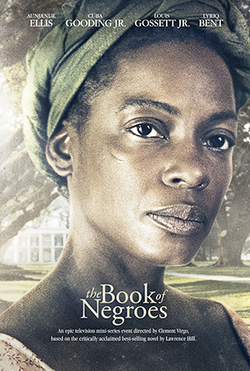The Book of Negroes (miniseries)
| The Book of Negroes | |
|---|---|
 |
|
| Genre | Drama |
| Based on | The Book of Negroes by Lawrence Hill |
| Screenplay by | Clement Virgo and Lawrence Hill |
| Directed by | Clement Virgo |
| Starring |
Aunjanue Ellis Lyriq Bent Cuba Gooding, Jr. Louis Gossett, Jr. Ben Chaplin Allan Hawco Greg Bryk Jane Alexander |
| Music by | Phillip Miller |
| Country of origin | Canada |
| Original language(s) | English |
| No. of episodes | 6 |
| Production | |
| Producer(s) |
Damon D'Oliveira Clement Virgo |
| Cinematography | Giulio Biccari |
| Editor(s) | Susan Shipton Kye Meechan |
| Distributor | Entertainment One Television |
| Release | |
| Original network |
CBC BET |
| Original release | January 7 – February 11, 2015 |
| External links | |
| Official CBC Website | |
| Official BET Website | |
The Book of Negroes is a miniseries based on the novel of the same name by Lawrence Hill. The six-part miniseries derives its origins from the historical document Book of Negroes and tells the story of a woman forcefully brought to South Carolina from West Africa at the time of the American Revolution. Clement Virgo and Hill collaborated on writing the miniseries, with Virgo also directing.
It premiered on CBC in Canada on January 7, 2015 and on BET in the United States on February 16, 2015.
In 1750, eleven-year-old Aminata Diallo is abducted from her village in West Africa, placed in shackles, and sent across the ocean to be sold into slavery on a South Carolina indigo plantation. She falls in love and marries a fellow West African slave named Chekura but when their baby is brutally abducted and sold by jealous slave master, Robinson Appleby, Aminata vows to return one day to her homeland.
Solomon Lindo, a sympathetic indigo inspector, plucks Aminata out of Appleby’s enslavement and takes her to New York where she attempts a successful escape. Amidst the rising threat of the American War of Independence, she is recruited by Sir John Clarkson to help register names of Black Loyalists in a ledger known as The Book of Negroes, granting them freedom and passage to Nova Scotia.
Separated from her husband, Aminata encounters more hardship in Nova Scotia when tensions flare between the White and Black communities over the scarcity of work in the Shelburne Riots. Aminata successfully petitions British abolitionists, who organize passage to Africa for 1,200 former slaves—a final voyage that will reunite her with her homeland and allow her to give voice to her life story.
When the proponents of the American Revolution, the Patriots, won the war, many of those on the other side, the Loyalists, decided to leave what had been the Thirteen Colonies, now the United States, for a new home elsewhere in British America. Tens of thousands of these refugees came through New York City, where their evacuation was processed by the British Army, leading up to Evacuation Day on 25 November 1783. The Book of Negroes was created in order to ascertain which former slaves were eligible to leave; it was assembled by Samuel Birch, the namesake of Birchtown, Nova Scotia, under the direction of Guy Carleton, 1st Baron Dorchester. (For more background, see Dunmore's Proclamation, a 1775 promise by the royal governor of the British Colony of Virginia to grant emancipation (freedom) to slaves who left revolutionary masters.)
...
Wikipedia
